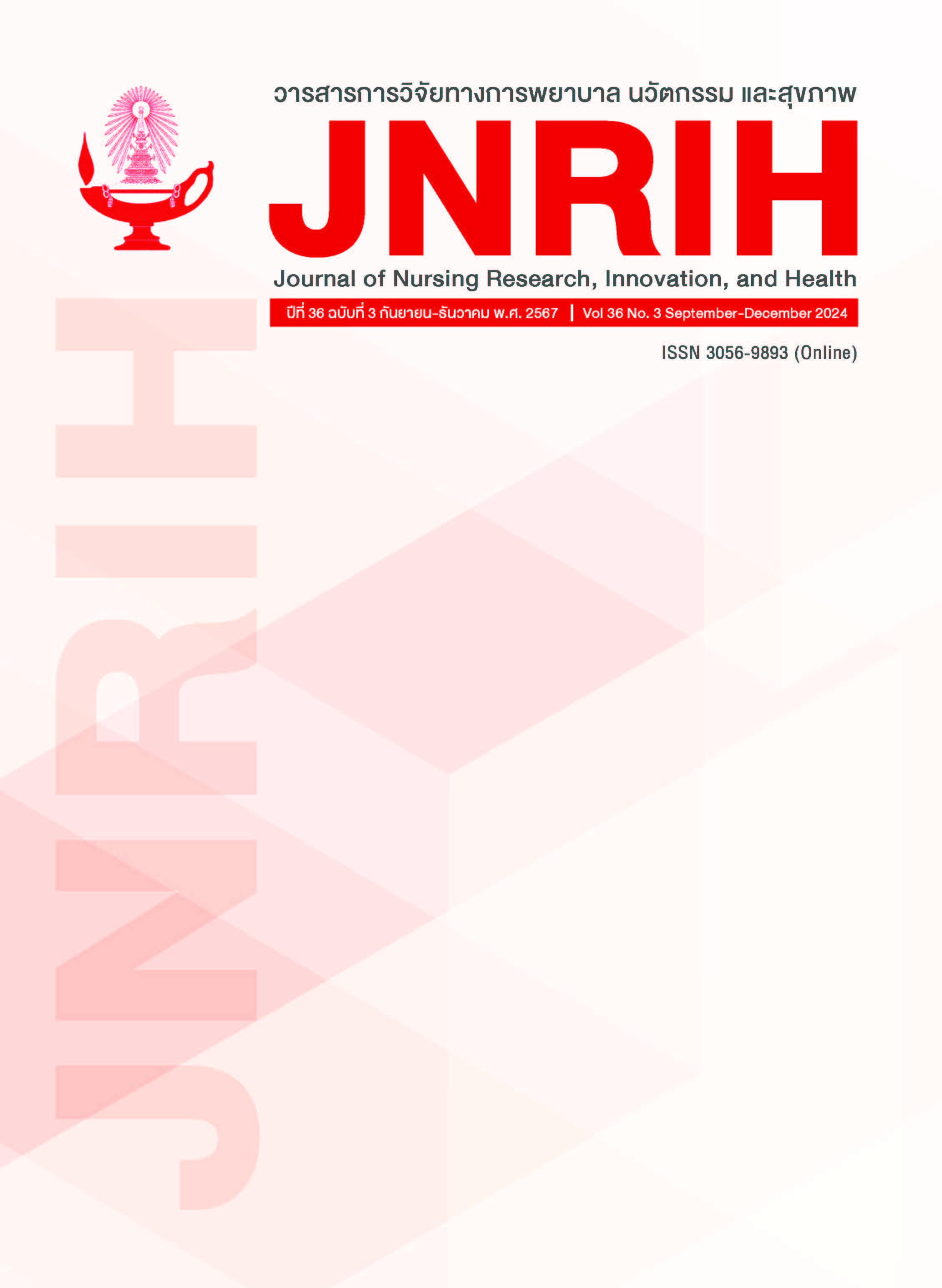ปัจจัยคัดสรรที่สัมพันธ์กับความต้องการการดูแลแบบสนับสนุนของผู้ที่เป็นมะเร็งเต้านมรายใหม่
คำสำคัญ:
มะเร็งเต้านมรายใหม่, ความต้องการการดูแลแบบสนับสนุนบทคัดย่อ
วัตถุประสงค์: ศึกษาความต้องการการดูแลแบบสนับสนุนและความสัมพันธ์ระหว่างปัจจัยคัดสรรได้แก่ อายุ สถานภาพสมรส ระดับการศึกษา การรักษา ความวิตกกังวล ความทุกข์ทรมานจากอาการ และการสนับสนุนทางสังคมกับความต้องการการดูแลแบบสนับสนุนของผู้ที่เป็นมะเร็งเต้านมรายใหม่
รูปแบบการวิจัย: พรรณนาเชิงความสัมพันธ์
วิธีดำเนินการวิจัย: กลุ่มตัวอย่างคือ ผู้ที่เป็นมะเร็งเต้านมรายใหม่จำนวน 133 คนที่เข้ารับการรักษาในโรงพยาบาลตติยภูมิในเขตกรุงเทพฯ 2 แห่ง โดยวิธีสุ่มแบบหลายขั้นตอน ช่วงเดือน พฤศจิกายน 2566 ถึงเมษายน 2567 เครื่องมือที่ใช้คือ แบบสอบถามข้อมูลส่วนบุคคล แบบสอบถามความต้องการการดูแลแบบสนับสนุน แบบสอบถามความวิตกกังวลตามสถานการณ์ แบบสอบถามความทุกข์ทรมานจากอาการ และแบบสอบถามการสนับสนุนทางสังคม ค่าสัมประสิทธิ์แอลฟาครอนบาค มีค่าเท่ากับ .96, .95, .85 และ .82 ตามลำดับ วิเคราะห์ความสัมพันธ์โดยสถิติสหสัมพันธ์เพียร์สัน พอยท์ไบซีเรียล และสเปียร์แมน
ผลการศึกษา: ผู้ป่วยมะเร็งเต้านมรายใหม่ส่วนใหญ่อายุเฉลี่ย 55 ปี สถานภาพสมรส ระดับการศึกษาปริญญาตรีมีความต้องการการดูแลแบบสนับสนุนในระดับน้อย คะแนนเฉลี่ยเท่ากับ 2.39 (SD = 0.78) ด้านระบบสุขภาพและข้อมูล มีความต้องการระดับปานกลาง คะแนนเฉลี่ยเท่ากับ 3.09 (SD = 0.91) รองลงมาคือด้านการดูแลผู้ป่วยและการสนับสนุน คะแนนเฉลี่ยเท่ากับ 2.80 (SD = 1.22) ความวิตกกังวล ความทุกข์ทรมานจากอาการ มีความสัมพันธ์กับความต้องการการดูแลแบบสนับสนุนในระดับปานกลาง (ขณะเผชิญ r = .40, แบบแฝง r = .41, r = .45, p<.001) การสนับสนุนทางสังคมมีความสัมพันธ์กับความต้องการการดูแลแบบสนับสนุนในระดับน้อย (r = -.18, p<.05) อายุ สถานภาพ ระดับการศึกษาและการรักษาไม่มีความสัมพันธ์กับความต้องการการดูแลแบบสนับสนุน
สรุป: ผลการศึกษาสามารถพัฒนาแนวทางการพยาบาลผู้ที่เป็นมะเร็งเต้านมรายใหม่โดยแบ่งเป็นรายด้าน โดยเฉพาะความต้องการด้านระบบสุขภาพและข้อมูลเพื่อตอบสนองกับความต้องการได้อย่างเหมาะสม
เอกสารอ้างอิง
Kaewubon J. The Effective of program providing information to quality of life among the breast cancer patient receiving breast surgery. Academic Journal of Mahasarakham Provincial Public Health Office [Internet]. 2020 [cited 2024 Jun 4]; 4(7): 13-27. Available from: https://thaidj.org/index.php/AJMP/article/view/8901. (In Thai)
Okediji PT, Salako O, Fatiregun OO. Pattern and predictors of unmet supportive care needs in cancer patients. Cureus [Internet]. 2017 May 9 [cited 2024 Jun 4]; 9(5): e1234. doi: 10.77 59/cureus.1234. PMID: 28620565; PMCID: PMC5467772.
Bonevski B et al. Evaluation of an instrument to assess the needs of patients with cancer. Supportive Care Review Group. Cancer [Internet]. 2000 Jan 1 [cited 2024 Jun 4]; 88(1): 217-25. doi: 10.1002/(sici)1097-0142(20000101)88:1<217: aid-cncr29>3.0.co;2-y. PMID: 10618626.
Sanson-Fisher R et al. The unmet supportive care needs of patients with cancer. Supportive Care Review Group. Cancer [Internet]. 2000 Jan 1 [cited 2024 Jun 4]; 88(1): 226-37. doi: 10.1002/(sici)1097-0142(20000101)88:1<226: :aid-cncr30> 3.3.co;2-g. PMID: 10618627.
Chowdhury SH, Banu B, Akter N, Hossain SM. Unmet supportive care needs and predictor of breast cancer patients in Bangladesh: A cross-sectional study. J Oncol Pharm Pract [Internet]. 2022 Dec [cited 2024 Jun 4]; 28(8): 1687-95. doi: 10.1177/10781552211039114. Epub 2021 Sep 30. PMID: 34590516.
Pérez-Fortis A et al. Prevalence and factors associated with supportive care needs among newly diagnosed Mexican breast cancer patients. Support Care Cancer [Internet]. 2017 Oct [cited 2024 Jun 4]; 25(10): 3273-80. doi: 10.1007/s00520-017-3741-5. Epub 2017 May 17. PMID: 28516220; PMCID: PMC5577048.
Hwang SY, Park BW. The perceived care needs of breast cancer patients in Korea. Yonsei Med J [Internet]. 2006 Aug 31 [cited 2024 Jun 4]; 47(4): 524-33. doi: 10.3349/ymj.2006.47. 4.524. PMID: 16941743; PMCID: PMC2687734.
Abdollahzadeh F et al. Un-met supportive care needs of Iranian breast cancer patients. Asian Pac J Cancer Prev [Internet]. 2014 [cited 2024 Jun 4]; 15(9): 3933-8. doi: 10.7314/apjcp.2014. 15.9.3933. PMID: 24935576.
Liao MN et al. Changes and predictors of unmet supportive care needs in Taiwanese women with newly diagnosed breast cancer. Oncol Nurs Forum [Internet]. 2012 Sep [cited 2024 Jun 4]; 39(5): E380-9. doi: 10.1188/12.ONF.E380-E389. PMID: 22940517.
Au A et al. Supportive care needs in Hong Kong Chinese women confronting advanced breast cancer. Psychooncology [Internet]. 2013 May [cited 2024 Jun 4]; 22(5): 1144-51. doi: 10.1002/pon.3119. Epub 2012 Jun 19. PMID: 22715115.
Girgis A, Boyes A, Sanson-Fisher RW, Burrows S. Perceived needs of women diagnosed with breast cancer: rural versus urban location. Aust N Z J Public Health [Internet]. 2000 Apr [cited 2024 Jun 4]; 24(2): 166-73. doi: 10.1111/j.1467- 842x.2000.tb00137.x. PMID: 10790936.
Lam WW et al. Unmet supportive care needs: a cross-cultural comparison between Hong Kong Chinese and German Caucasian women with breast cancer. Breast Cancer Res Treat [Internet]. 2011 Nov [cited 2024 Jun 4]; 130(2): 531-41. doi: 10.1007/s10549-011-1592-1. Epub 2011 May 27. PMID: 21617919.
Schmid-Büchi S, Halfens RJ, Müller M, Dassen T, van den Borne B. Factors associated with supportive care needs of patients under treatment for breast cancer. Eur J Oncol Nurs [Internet]. 2013 Feb [cited 2024 Jun 4]; 17(1): 22-9. doi: 10.1016/j.ejon.2012.02.003. Epub 2012 Mar 25. PMID: 22449715.
Unjai S, Somjaivong B. Translation and reliability of the supportive care needs survey Thai version in cervical cancer patients. Journal of Nursing Science & Health [Internet]. 2016 [cited 2024 Jun 4]; 39(3): 119-26. Available from: https://he01.tci-thaijo.org/index.php/nah/ article/view/58495/61279. (In Thai).
Sinuanchaeng B. Educative-supportive care needs, received and satisfaction among patients with early stage cancer. Journal of Nursing Science & Health [Internet]. 2018 [cited 2024 Jun 4]; 41(1): 24-33. Available from: https://he01.tci-thaijo.org/index.php/nah/article/view/ 100524. (In Thai).
Fiszer C, Dolbeault S, Sultan S, Brédart A. Prevalence, intensity, and predictors of the supportive care needs of women diagnosed with breast cancer: a systematic review. Psychooncology [Internet]. 2014 Apr [cited 2024 Jun 4]; 23(4): 361-74. doi: 10.1002/pon. 3432. Epub 2013 Oct 28. PMID: 24677334.
Chantamit-O-Pas MC, Potaros D, Pichaya P. Supportive Care Needs and Its Predictors among Patients with Breast Cancer. The Journal of Faculty of Nursing Burapha University [Internet]. 2022 [cited 2024 Jun 4]; 30(2): 25-39. Available from: https://nurse.buu.ac.th/rsh/ file/journal/0000001290.pdf. (In Thai).
Yottavee W, LowThumma P, Chidnayee S, Chaiwongnakpun C, Tummee S. Adaptation of woman with breast cancer. Boromarajonani College of Nursing, Uttaradit Journal [Internet]. 2019 [cited 2024 Jun 4]; 11(2): 272-83. Available from: https://he01.tci-thaijo.org/index.php/unc/article/view/ 231644/158091. (In Thai).
ดาวน์โหลด
เผยแพร่แล้ว
ฉบับ
ประเภทบทความ
สัญญาอนุญาต
ลิขสิทธิ์ (c) 2024 วารสารการวิจัยทางการพยาบาล นวัตกรรม และสุขภาพ

อนุญาตภายใต้เงื่อนไข Creative Commons Attribution-NonCommercial-NoDerivatives 4.0 International License.
##default.contextSettings.thaijo.licenseTerms##


